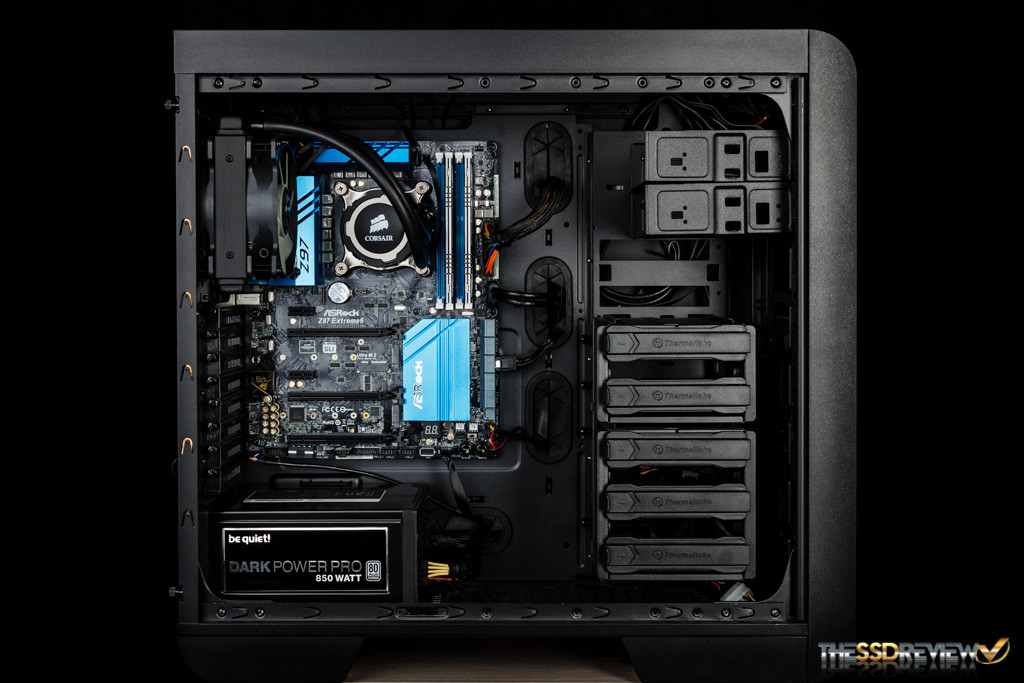TSSDR TEST BENCH AND PROTOCOL
SSD testing at TSSDR differs slightly, depending on whether we are looking at consumer or enterprise SSDs. For consumer SSDs, our goal is to test in a system that has been optimized with our SSD Optimization Guide. To see the best performance possible the CPU C states have been disabled, C1E support has been disabled, Enhanced Intel SpeedStep Technology (EIST) has been disabled. Benchmarks for consumer testing are also benchmarks with a fresh drive so, not only can we verify that manufacturer specifications are in line but also, so the consumer can replicate our tests to confirm that they have an SSD that is top-notch. We even provide links to most of the benchmarks used in the report.
SYSTEM COMPONENTS
This Test Bench build was the result of some great relationships and purchase; our appreciation goes to those who jumped in specifically to help the cause. Key contributors to this build are our friends at ASRock for the motherboard and CPU and be quiet! for the PSU and cooling fans. Also, a big thank you to Thermaltake for the case and Kingston for the RAM. We have detailed all components in the table below and they are all linked should you wish to make a duplicate of our system as so many seem to do, or check out the price of any single component. As always, we appreciate your support in any purchase through our links!
| PC CHASSIS: | Thermaltake Core V51 |
| MOTHERBOARD: | ASRock Z97 Extreme6 |
| CPU: | Intel Core i5-4670K |
| CPU COOLER: | Corsair H75 |
| POWER SUPPLY: | be quiet! Dark Power Pro 10 850W |
| SYSTEM COOLING: | be quiet! Silent Wings 2 |
| MEMORY: | Kingston HyperX Beast 2400Mhz |
| STORAGE: | Samsung 850 Pro |
BENCHMARK SOFTWARE
The software in use for today’s analysis is typical of many of our reviews and consists of ATTO Disk Benchmark, Crystal Disk Info, Crystal Disk Mark, AS SSD, Anvil’s Storage Utilities, PCMark 8, and PCMark Vantage. We prefer to test with easily accessible software that the consumer can obtain, and in many cases, we even provide links. Our selection of software allows each to build on the last and to provide validation to results already obtained.
Crystal Disk Info is a great tool for displaying the characteristics and health of storage devices. It displays everything from temperatures, to the number of hours the device has been powered, and even to the extent of informing you of the firmware of the device.
240GB:
480GB:
960GB:
Crystal Disk Info shows us a multitude of S.M.A.R.T. data for these drives including a working read and write counter as well as a total NAND writes counter to show actual writes with write amplification factored in. There is also a working temperature sensor built into the controller. The firmware revision we are testing with today is 1.00. As this is more of desktop enthusiast oriented SSD and the controller was developed quite a while ago, there is no support for DevSleep. However, you can see that TRIM and NCQ are still functioning.
 The SSD Review The Worlds Dedicated SSD Education and Review Resource |
The SSD Review The Worlds Dedicated SSD Education and Review Resource | 


How long is it going to be before we forget-
“Friends DON’T let friends OCZ” ??????????
oh yeah, that’s so eighties…
PC Perspective threw an interesting monkey wrench at this device.
“With firmware 1.01 (current as of this writing), the Vector 180 halts every 20 seconds during sustained writes. TRIM operations also result in obvious stalls in subsequent host writes.”
Our final outlook of this SSD is determinate of all tests, the most demanding of which is PCMark 8. PCMark 8 puts the SSD through 18 hours of the most grueling activity, and well above consumer demands. The best part of independent testing is that there is always more than a single review to rely on. Obviously, we had a great respect for this SSD with the firmware on hand.
Why is the Mushkin Reactor in the consistency bandwidth charts with these drives when it is low to middle tier and the rest are top of the line ssds? Why not show the top of the line Mushkin Striker comparison instead?
I included the reactor to show a comparison to how an entry level SSD stands against the top tier SSDs. We also do not have a mushkin striker to compare.
Ok sounds good. Could you test an compare some of the new top brand ssds ? Mushkin Striker, Pny cs2111, Patriot Blaze, Corsair Neutron XT? I would like to see consistency bandwidth comparisons for these ssds. This way we can see how the new controllers stack up against each other. I hope you get some soon!
It is nice to see a company provide 3 different capacities to review at the same time.
The PFM is interesting but as stated it does not protect the data itself. You won’t have a bricked SSD but you’ll have corrupted data (and a full restore on your hands) if power is lost and the cache is holding write data. Supercaps are the only thing that will prevent that. Crucial showed that with the M500 series. Wish more companies jumped on that bandwagon.
How long will it take to forget-“Friends don’t let friends OCZ”